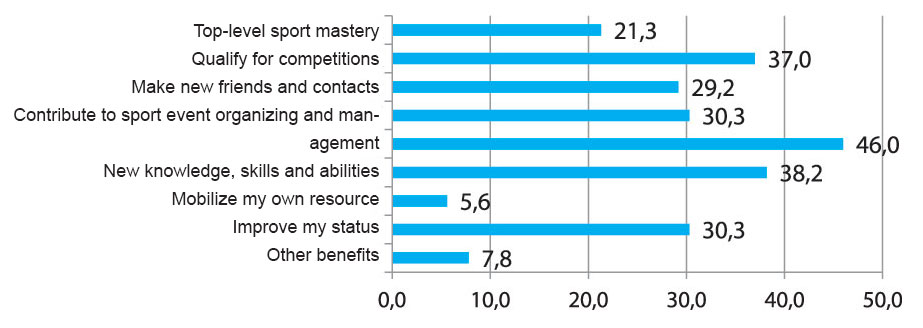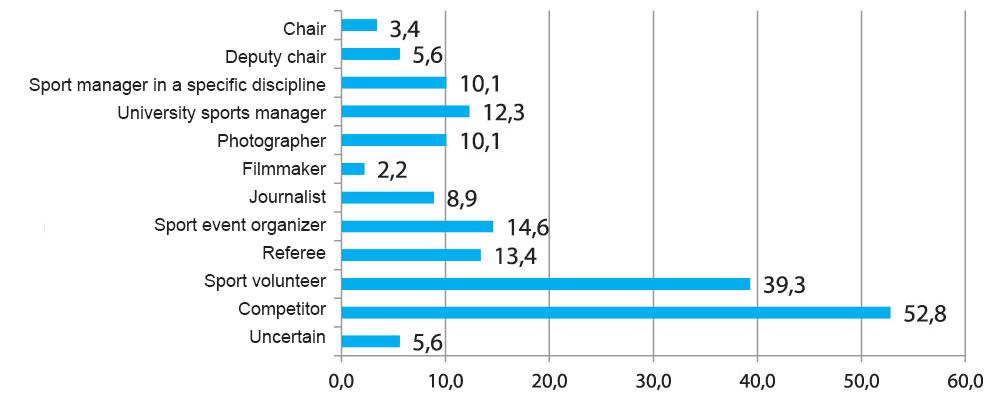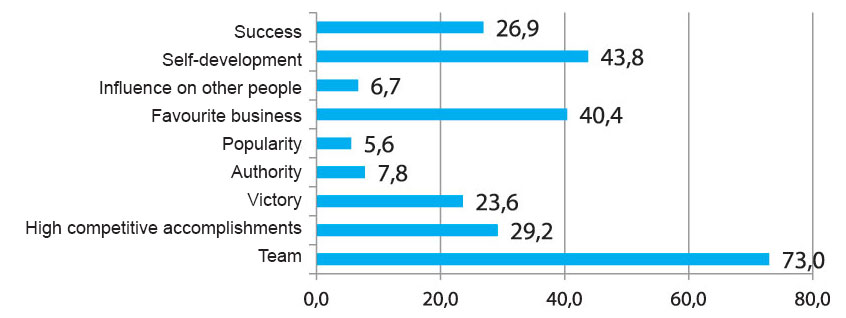Effect of academic sports clubbing activity on university graduates' competitiveness
ˑ:
PhD, Associate Professor N.V. Peshkova1
1Surgut State University, Surgut
Keywords: academic sports, competitiveness, students, academic sport clubs.
Background. For the last few years the academic sports have demonstrated growing popularity in the national youth communities, with the progress being largely due to the persistent efforts of the Russian government on the whole and Ministry of Sports in particular to promote and institutionalize the academic sport disciplines and give them the deserved role and positions in the national elite and mass sports systems.
It should be mentioned in this context that the Academic Sports Development Concept of the Russian Federation for the period up to 2025 was approved in 2017 to spell out the top priority avenues for progress of the sports sector including the provision to “improve the students’ socializing mechanism by facilitating their self-management sports projects and initiatives at the educational establishments” [6].
Many sport researchers and analysts have mentioned that sports viewed as an important social phenomenon provide a powerful socializing impetus to the athletes contributing to their personality formation and development process and help mobilize the still untapped individual physical and spiritual resources; albeit the sporting resource mobilizing efforts shall be reasonably designed and managed to be efficient, plus supported by the relevant provisions that may be viewed as catalysts for the progress [1, 4].
Such progress facilitating institutional and educational provisions are being successfully offered nowadays by the leading national academic establishments including universities. To advance the academic mass sports, physical education and health services and effectively lure students into physical trainings and competitions, the universities establish sport clubs acting in close cooperation with academic physical education departments. However, as we have mentioned before, the degrees of commitment of the student population for such projects and initiatives are still low enough and, hence, a special priority shall be given to the efforts to cultivate their conscientious needs and motivations for the sport practices for the process missions and goals to be attained [7]. One of the ways to change the situation is to offer certain freedom to students up to the mass sports self-management formats with the students considered as active contributors to the sporting process rather than controlled subjects.
As things now stand, it is the academic sport clubs that have been in progress since 2013 when the Student Sport Clubs Association of Russia was established as a national public organization that is now viewed as the basic model of students’ self-management process in the academic system. The clubs are advanced on the assumption that the joint sporting activity of young people in the sport clubs facilitates the personality development process; helps mobilize their creative resources; cultivates self-reliance, responsibility and teamwork skills to facilitate their socializing process.
The expected benefits of the initiatives to promote the students’ self management models in the academic physical education and sports system will contribute to the mission of the modern academic education – that is to train a highly competent specialist and fully-fledged personality well prepared for socializing and self-fulfillment upon graduation; and improve the specialist competitiveness in many domains including the relevant social competences and high ethical behavioural (general and professional) standards [8]. It should be mentioned that the successful socializing process is ranked among the most important constituents of the specialist competitiveness on the labour markets. The individual competitiveness has been subject to research in a variety of modern sciences including philosophy, psychology, education science etc., with the notion of competitiveness often interpreted as professionalism.
It may be pertinent to mention the study of the students’ competitiveness related issues by Y.V. Astapenko who interprets a university graduate’s competitiveness as an integrated quality composed of a variety of personality qualities including responsibility, creative decision-making, self-rating and self-positioning abilities, motivations for learning and cooperation. As provided by the researcher, “student communities may be described as the social groups with high education backgrounds and cognitive motivations forming a socio-cultural basis for high competitiveness being cultivated among the other key personality qualities” [3, p. 12].
A.A. Angelovskiy offers a more detailed definition of the notion, with the university student competitiveness interpreted as the integral personality credential in the pre-graduation period composed of the relevant professional, personal and poly-professional components largely determined by knowledge, skills, practical experience, ethical standards etc. for success on the labour markets – that implies the professional progress goals to be attained in the corporate businesses in harsh competitive environments [2]. Furthermore, D.A. Konoplyansky defines a competitive university graduate as the personality having a sound professional university background with a set of professional, personality, mental and ethical qualities making it possible for him/her to succeed in competitions with other professionals on modern labour markets [5].
Summarizing the findings of the above and other studies of the notion and meanings of the university student competitiveness, it may be pertinent to highlight at least the following two components of the key interpretations: (1) high competency in the professional domain; and (2) good personality qualities of the beginner specialist with an emphasis on the self-reliant progress and perfection, communication, decision-making and teamwork abilities.
In opinions of many researchers, the development opportunities offered by the modern academic sports with the students being engaged both in the training and competitive processes and in the physical training/ mass sports/ recreation event organizing and management activities including those on a volunteer basis – may facilitate progress in the above-mentioned second domain of competitiveness; albeit much depends on the students’ own attitudes to and determination in the sport club activity in this context.
Objective of the study was to profile the students’ attitudes to academic sport clubs.
Methods and structure of the study. A questionnaire survey to mine the empirical data on the subject was performed at Surgut State University (SSU) in 2017 with application of the relevant Google sample. The questionnaire survey form offered only 15 questions to find the students’ awareness of the academic sport club services; willingness to join the club activities; and expected individual benefits from the club activity. Most of the questions other than those offering only Yes and No responses welcomed discretional unlimited responses. Subject to the survey were the first-to-fifth year Surgut State University students (n=89, including 67 females and 22 males).
Study results and discussion. Given on Figure 1 hereunder are the survey data for the expected individual benefits from the club activity.

Figure 1. “What personal benefits do you expect from the club activity?”
It should be noted that the individual expectations are dominated by the ‘New knowledge, skills and abilities’ (46.0% of the sample); ‘Mobilize my own resource’ (38.2%); and ‘Qualify for competitions’ (37.0%); with only 5.6% of the sample driven by the status improvement motivation.
It is regretful to find only 30.3% of the sample found willing to contribute to the sport events organizing and management process.
The insufficient determination of the students in the academic spots management domain was further substantiated by their responses to the question “What role would you prefer in the student sport club activity?” – see Figure 2. Most of the respondents were found to prefer the roles of competitors and volunteers in sport events (52.8% and 39.3% of the sample, respectively); with only 10-14% of the sample prepared to contribute to the academic physical education and sports, sport events and their promotion in the electronic/ printed media.

Figure 2. “What role would you prefer in the student sport club activity?”
Since the sample was very wide i.e. age- and specialty-unspecific, low determination and unwillingness to contribute to the sport process organizing efforts may be explained by the still poor awareness of the students of these matters and their doubts of their own management skills.
Given on Figure 3 hereunder are the results of the associations test, with the students offered to check one of the options or give own versions in responses to the question “What are your dominant associations with concern to the academic sport club?”

Figure 3. “What are your dominant associations with concern to the academic sport club?”
The responses were dominated by the team related associations (73.0%) followed by the self-development (43.8%) and favourite business (40.4%) ones; whilst the high competitive accomplishments (29.2%) were ranked only the fourth.
Conclusion. The questionnaire survey data and analyses showed the potentialities of the academic club movement being highly rated by the respondents; with the teamwork in the academic clubs expected to help the students develop team spirit, acquire new knowledge, skills and abilities and find new self-development opportunities; and with all these competences and credentials, as demonstrated above, being the dominant constituents of the university student’s competitiveness. Many students, however, were tested unprepared for the sport organizing and management responsibilities due to the still low competency levels. The study data shows the need for a higher priority to be given to the efforts of the academic sport management entities (including physical education departments and academic sport clubs) being integrated to design and implement the relevant promotion and public awareness initiatives and events.
References
- Alekseev S.V., Gostev R.G., Kuramshin Yu.F. et al Fizicheskaya kultura i sport v Rossiyskoy Federatsii: novye vyzovy sovremennosti [Physical Culture and Sport in the Russian Federation: New Challenges of Today]. Moscow: Teoriya i praktika fizicheskoy kultury i sporta publ., 2013, 780 p.
- Angelovskiy A.A. Formirovanie konkurentosposobnosti studentov v protsesse professionalnoy podgotovki v vuze. Dis. kand. ped. nauk [Student's competitiveness building process in academic vocational training. PhD diss.]. Magnitogorsk, 2004, 193 [.
- Astapenko E.V. Pedagogicheskoe obespechenie formirovaniya konkurentosposobnosti lichnosti studenta v obrazovatelnom protsesse vuza. Avtoref. dis. kand. ped nauk [Pedagogical support of student's competitiveness building process during university studies. PhD diss. abstract]. Krasnoyarsk, 2008, 25 p.
- Galkin S.V. Metodika sportivno-patrioticheskogo vospitaniya uchaschikhsya detsko-yunosheskikh sportivnykh shkol. Avtoref. dis. kand. ped. nauk [Technology of sports-patriotic education for children and youth sports schools. PhD diss. abstract]. Volgograd, 2005, 28 p.
- Konoplyanskiy D.A. Pedagogicheskaya strategiya formirovaniya konkurentosposobnosti vypusknika vuza. Avtoref. dis. dokt. ped. nauk [Educational competitiveness building strategy for university graduates. Doct. diss. abstract (Hab.)]. Kemerovo, 2017, 39 p.
- Kontseptsiya razvitiya studencheskogo sporta v Rossiyskoy Federatsii na period do 2015 goda (utv. prikazom Minsporta Rossii ot 21.11.2017 g., no 1007) [The concept of the development of university sports in the Russian Federation for the period until 2015 (approved by the order of the Ministry of Sport of Russia dated November 21, 2017, no 1007).].
- Peshkova N.V., Kosenok S.M. Polisubjektnoe upravlenie razvitiem massovogo studencheskogo sporta v vuze [Mass university sports development projects: multilateral management model]. Teoriya i praktika fiz. kultury, 2017, no. 5, pp. 83-85.
- Tuguz F.K., Lyausheva S.A. Eticheskiy kodeks universiteta kak resurs sotsializatsii studentov [Ethical code of the university as a resource of socialization of students]. Vestnik Adygeyskogo gosudarstvennogo universiteta. Ser. 1 ‘Regionovedenie: filosofiya, istoriya, sotsiologiya, yurisprudentsiya, politologiya, kulturologiya’, 2013, no. 4(130), pp. 164-173.
Corresponding author: peshkova_ffk@mail.ru
Abstract
The study considers some issues of the academic sports self-management process and its potential contributions to the university graduates’ competitiveness. It should be mentioned that the academic sport clubs have been in progress since 2013 when the Student Sport Clubs Association of Russia was established as a national public organization. The study proceeded from the assumption that the academic sport club activity should facilitate the personality progress of future graduates; develop their creative resource, self-reliance, responsibility, teamwork spirit and abilities; and these credentials should facilitate their socializing process and careers upon graduation. A questionnaire survey of the first-to-fifth year Surgut State University students, however, showed the students being largely inactive in the management skills building domain. We believe that the situation is due to the still low awareness and competences of the students in the management issues and, hence, their uncertainty as to their own management qualities and benefits. The study data shows the need for a higher priority to be given to the efforts of the academic sport management entities (including physical education departments and academic sport clubs) being integrated to design and implement the relevant promotion and public awareness initiatives and events.


 Журнал "THEORY AND PRACTICE
Журнал "THEORY AND PRACTICE